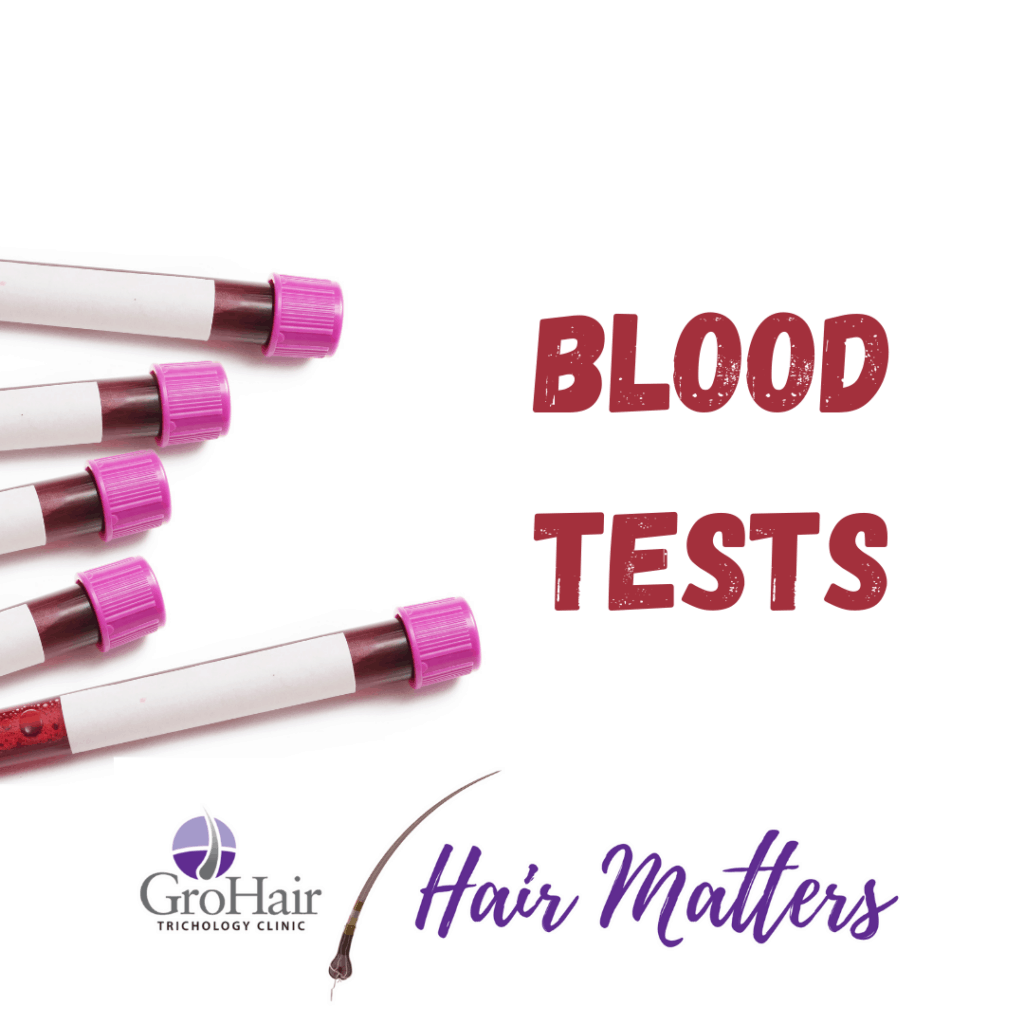
Blood tests can be an extremely useful tool during a hair loss investigation, particularly with female hair loss issues. Hair loss is often a symptom of another health issue, rather than a condition in its own right, so finding out how things are on the inside can be crucial to tackling a hair loss issue successfully.
Read on to find out more!
What is blood?
Blood is a type of liquid connective tissue composed of various blood cells suspended in a fluid called blood plasma. Our blood acts as a huge transportation system, carrying oxygen, nutrients, and hormones to all the cells of the body, and then removing carbon dioxide and other cellular waste so it can be expelled from the body. Blood is also involved in thermoregulation (regulating body temperature), maintaining a balance of body fluids, regulating PH, and has a vital role in our immunity, transporting white blood cells and specialised proteins (antibodies) to protect us from infection and disease.
What can a blood test tell us?
A blood test gives us a snapshot of our current state of health and wellbeing. The term ‘snapshot’ is important here, as levels in our blood fluctuate all the time (even throughout the day), so a blood test is only telling us what was happening at that point in time that you had your test done. Therefore, from time to time you may get asked to have some repeat tests done a few months down the line to get a clearer picture of what’s happening. Blood levels can also be affected by stress, medication, supplementation, illness, lack of sleep, and even what you have had to eat! So, there are all sorts of considerations to take into account when it comes to evaluating a blood test result (which is why it is never a good idea to attempt to interpret them yourself!). A Trichologist is trained to analyse blood levels which are relevant to scalp and hair issues, so we can identify what is likely to be contributing to the problem.
Blood tests for hair problems.
There are numerous forms of alopecia (hair loss), one can be entirely different to next, and each can develop from its own unique set of causes and mechanisms, so there is no predetermined set of blood tests exclusively for hair loss. We would need to consider any symptoms you have in addition to your hair loss, existing medical issues, family history, age, diet etc… so the blood tests are relevant to your individual circumstances.
There are some health issues which more commonly affect the hair, such as iron deficiency and thyroid disease so these tend to be tested more frequently.
Blood tests which may be requested for common hair loss issues include:
- Complete blood count (CBC) – This measures the health of your red blood cells, white blood cells, and platelets (clotting factors). This can be especially useful when evaluating alongside other tests such as iron studies.
- Ferritin – this is the protein which stores iron and is an ideal marker for assessing iron levels associated with hair loss.
- Erythrocyte sedimentation rate (ESR) or C-Reactive protein (CRP) – these measure systemic inflammation. Ferritin can be raised in the presence of inflammation, so it is a good idea to have ferritin tested alongside ESR/CRP.
- Thyroid function (TSH, FT3, FT4) – Thyroid stimulating hormone (TSH) is produced by the pituitary, which stimulates the thyroid to produce more T3/T4 (thyroid hormones). FT3 and FT4 are hormones produced by the thyroid which are available for cells to use. Testing these would tell us how the thyroid is responding to levels of TSH.
- Vitamin D (25-OH Vitamin D3) – There are numerous vitamin D receptors associated with major cells of the hair follicle, which demonstrate the importance of vitamin D in hair follicle cycling. I do see low vitamin D levels with many hair loss patients, particularly with auto-immune issues.
There are circumstances which may warrant additional tests.
If you are on a restricted diet and/or are displaying symptoms of fatigue we may also want to test B vitamins (including B12 and folate), as well as a full iron profile.
If you have a family history of thyroid disease, a more comprehensive thyroid panel may also be useful.
Additional hormone analogues may also be requested in some situations.
The blood tests my GP did came back normal, but I’m still losing my hair?
Firstly, a good GP should arrange blood tests if you have hair loss, so that’s a great start!
The question you need to ask here is…… what is NORMAL for your hair?
A GP will evaluate your blood test results using reference ranges provided by the corresponding lab that tested your blood. Levels that fall outside of these reference ranges indicate the possibility of an existing health issue or disease. In other words, a GP is checking to see if you are already in a state of ill health, which is good to know! Unfortunately, these ranges rarely flag up subclinical blood levels which would identify the likelihood of a problem developing later down the line, which you may already be experiencing symptoms with. Let us look at an example:
Ferritin is likely to be routinely checked by your GP if you are experiencing hair loss or fatigue. The average acceptable range for ferritin by most labs in the UK is 13 – 150 µg/L. So, if your ferritin returned at a level of 18 µg/L its possible your GP has declared this normal…. case closed!
The hair cycle unfortunately can be negatively affected by levels much higher than this, in fact many hair loss professionals would argue that anything under 70 µg/L has the potential to cause hair loss in some individuals, the more this level falls, the higher the risk!
*I must note here that we are all different and lower ferritin levels may be normal for you, and not everyone with iron deficiency anaemia will experience hair loss either. Its possible to have someone with a ferritin of 65 µg/L with hair loss, and another with a ferritin level of 5 µg/L with no hair loss.
A Trichologist will view your blood tests results in a different way to your GP and will look for levels that might be ‘normal’, but not ideal for sustaining an optimal hair cycle, which is why we like you to bring your ‘normal’ blood tests into clinic for us to evaluate.
Hair cells are the second fastest dividing cells in the body and require a huge amount of energy and nutrients to maintain all their hard work. If you are low on anything or have the early stages of a health issue, hair loss or a change in hair texture could be the first symptom you experience.
How do I arrange blood tests?
If you have already seen your GP and had some blood tests done (within the last 12 months), you can ask your surgery for a printout of your results which they should do without any issue. You can then forward these to your Trichologist once you have booked a consultation.
If you have not had any blood tests done, I do prefer to see patients in clinic first so I can gather any necessary information and perform a thorough examination, so the right blood tests can be ordered to fit your individual circumstances. This is the best way to ensure that all the relevant tests are done and avoids having to ask your GP to arrange more tests that may have been missed initially.
If blood tests are needed there are 2 options:
- Arrange through your GP – A referral letter will be provided for you following your consultation, one copy goes to your GP and another to you. You would need to contact your surgery and arrange an appointment to get your blood tests done. Once your results are back you would need to obtain a printout so I can evaluate your results for you. (on occasion your GP may refuse to arrange your blood tests, in which case we can go to option 2).
- Arrange Privately – We use a private lab which provide a ‘finger prick’ testing service that you can do from the comfort of your own home. These tests are reasonably priced, convenient, and easy to do. Once you have done the test you post it to the lab the same day, your results come straight back to me within a week which I review and then feed back to you. There is also an option to attend a partner clinic for a venous test if preferred. I do find many patients prefer private testing, instead of arranging through their GP.
If you are experiencing a scalp issue or hair loss, please do get in touch for advice and support. You can contact us through our booking page here.
